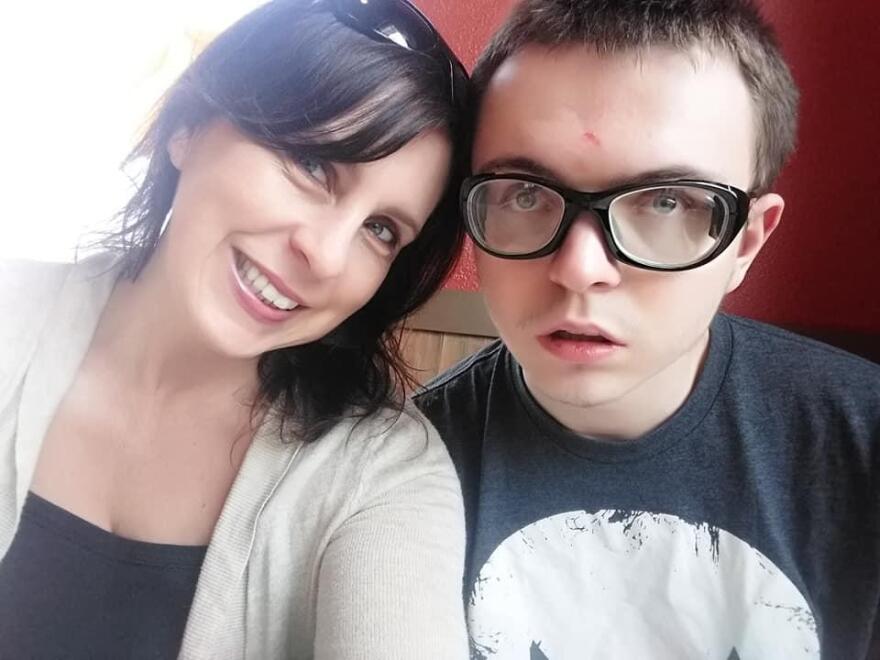ROCHESTER, NY (WXXI)- At 22, Jared Kaiser has spent half of his life in a group home. He is on the autism spectrum. He also has bipolar disorder and attention deficit hyperactivity disorder.
His mother, Jerri Lynn Sparks, said he needs to be in the structured setting of a group home because around the time Jared transitioned into puberty, he started acting out in a violent and dangerous way.
"It was the most heartbreaking decision I ever made," she said, "but it was one that was for his safety and that of my other children."
Before the pandemic, Jared came home every Sunday and the family would go on outings together -- boat trips on the Erie Canal, meals in restaurants. Sparks said her son, like others on the autism spectrum, is attached to his routines and they help him remain calm and happy.
But over four months of Sundays have passed since Jared and his family last spent that kind of time together.
"Coronavirus ... it changed our lives," Jared said.
According to the New York state Office for People With Developmental Disabilities, 2,544 of the roughly 38,000 people who live in group home residences across the state have tested positive for the virus as of July 6, and 384 of them have died from COVID-19.
To limit further infection, families were not allowed to visit group homes in the first three months of the pandemic, and residents couldn't go out.
Gov. Andrew Cuomo lifted the visitation ban on June 16.
Social distancing and face covering requirements are in place, as well as any other guidelines laid out by each facility.
The Hillside Family of Agencies owns and operates the Macedon group home where Jared has lived for the past 11 years. A spokesperson for the nonprofit said the state allows some latitude in determining the durations of family visits, and how and where they take place.
At Jared's residence, family visits are limited to the front yard for one hour at a time, according to his mother.
"He can go on an isolated hike where he has to stay 6 feet apart from the group home staff only. I can't go on the hikes," said Sparks. "I can't take him off the property; I can't visit with him inside his group home. I have to stay 6 feet apart from my son, masked, outside, for one hour. I can't hug him. I've not been allowed to hug my son for over four months."
Sparks called the restrictions unnecessary and heartless. She said Jared and his four housemates have behavioral challenges, but they're not medically fragile. She said he understands and complies with rules like mask wearing.
"He told me he feels lonely, he feels bored, and he doesn't understand," Sparks said. "He can see, when he goes on van rides, all the other people out buying ice cream at the shops and walking along the Erie Canal and he feels keenly that he is being treated differently."
Maria Cristalli, president and CEO at Hillside, said in a statement that the organization understands parents' pain and frustration with the restrictions. She said they have been working closely with families to arrange visits while continuing to follow the necessary safety protocols.
But there's one thing Sparks doesn't comprehend.
She said she works at home and faithfully practices social distancing and doesn't see why she would pose any more of a health threat to her son than group home workers who return to their own homes every day.
"I went over there to drop off supplies and Jared caught a glimpse of me. He came running across the parking lot to hug me and the group home workers, to keep their jobs, they had to stop him from coming to me. They had to put their bodies in front of me. This was the inflection point," Sparks said, crying. "This is inhumane."
To channel their frustration into action, Sparks and more than 4,000 other family members of people with disabilities have formed a Facebook group called New York Alliance for Developmental Disabilities.
They are asking Cuomo to include group homes in the state's phased-in reopening program and give clear guidance on what is and is not allowed rather than allowing group homes to impose what Sparks describes as "one-size-fits-all" limitations.
"What I think is that he is misinformed or not understanding somehow that all group homes are different," she said. "There's no one blanket policy that works because there are group homes with five members or less that are not medically fragile. The vast majority of residents in group homes, 61%, are under the risky age of 65 and the vast majority of them are small settings with their own bedrooms."
Sparks said she brought her concerns to both an aide to the governor and to the Office for People with Developmental Disabilities.
"They're each telling me it's the other person's responsibility," she said. "The outcome is that we have individuals languishing in group homes, unable to speak for themselves."
In response to an inquiry from WXXI News, a spokesperson for the Office for People with Developmental Disabilities said in an email that the agency hears and understands the frustration and concerns from families and that they're working with the state Department of Health on reopening steps that will safely include in-person services, home visits, and community outings.
The spokesperson did not respond to a question about when these changes are expected to take place.
This story is part of Move to Include, a public media initiative supported by the Corporation for Public Broadcasting, a private corporation funded by the American people. Additional funding provided by the Golisano Foundation.


